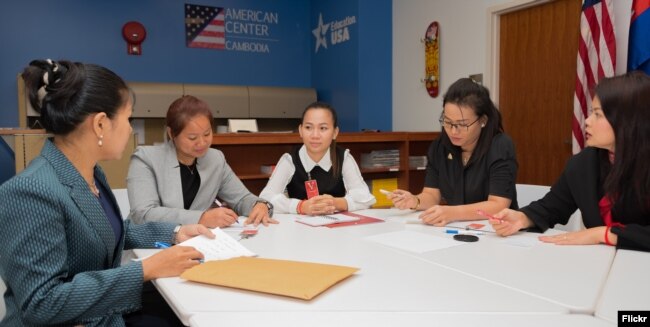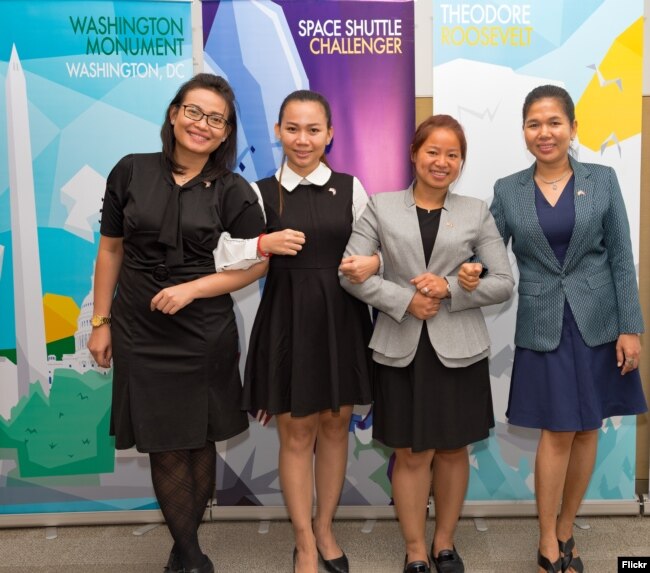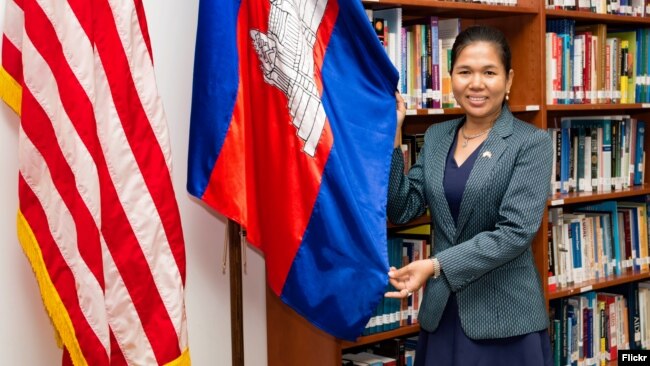Sreat Mom Sophear started SOPHIYA, which provides tourism, home management, spa wellness and beauty services, in 2005. At the time, she did not understand entrepreneurship, which the Harvard Business Review defines as “the pursuit of opportunity beyond resources controlled.”
“All I thought was about making money,” the 36-year-old said.
That has changed as her Phnom Penh-based company grew to employ more than 65 people.
“It’s not only about me and my business. It is also about helping others, providing job opportunities to people and contributing to the economy,” Sreat Mom Sophear told VOA during her visit to the United States under the State Department’s International Leadership Visitor Program for 10 days in September.
Sreat Mom Sophear and 11 other women from Cambodia’s private sector and state-run institutions met with business representatives and federal and state officials to learn more about business management, partnership and leadership.
The goal? Reshaping the business landscape in Cambodia to encourage women to run businesses, and to promote women as business leaders. But this means overcoming many challenges, many of which are familiar to ambitious women worldwide.
Leading a business is considered a man’s job in Cambodia, even though women own about 65 percent of the businesses, according to the National Institute of Statistics, where the numbers show most of the women-owned enterprises are small-scale and informal, employing only one or two people.
Women’s roles
Then there are other issues such as the continuing influence of traditional social and cultural code, the chbap srey, which believes women should be quiet and obedient and have limited educational opportunities. A lack of financial and business management training has prevented many women from scaling up their businesses, said Eng Lykuong, president of Cambodia Women Entrepreneurs Association (CWEA), a networking group supporting women in business.
And then there’s the challenge that working women face worldwide.
“Even though they become entrepreneurs, they are still expected to fulfill household roles,” she said, defining the so-called second shift. “I have to say that we work twice as hard as men. We are struggling to balance it [our business] with our role as mothers and wives.”
Ly Viriya, a shareholder of LM LIMA Angkor Food Co. Ltd. of Siem Reap, found balance at a personal cost.
“Had I not been separated [from my husband], I would not have been able to travel and continue my studies and improve myself,” she told VOA Cambodia, adding that the support from her family has been critical as she made career choices and undertook advocacy work through CWEA.
Building confidence
Ly Viriya believes that a lack of self-confidence is one of the key challenges for Cambodian women in business, particularly those in rural areas where there are fewer opportunities and education and income levels are lower than in urban areas.
“It takes a lot of training and encouragement to help them find confidence in themselves,” she said, adding, “I want to encourage more women to really believe that they can play important roles in society.”
Although Cambodia’s Ministry of Women’s Affairs is supporting private sector initiatives to empower women in business, it has signed several memoranda of understanding with women-led associations, such as CWEA and the Cambodia Women Business Federation (CWBF).
The three women, Sreat Mom Sophear, Eng Lykuong and Ly Viriya, know each other through CWEA, where they work to empower women. They also rally support from the government and business-partner organizations, including the American Chamber of Commerce of Cambodia (AmCham), to remove the obstacles that prevent women advancing further by growing the capacity of their businesses.
“In small- or medium-size business, you see a lot of women are running them, but when the business is large-scale or becomes a corporation, very few women make it that far,” said Eng Lykuong, adding that CWEA provides mentoring and capacity building programs that “upgrade their knowledge and skills.”
Entrepreneurial community
Touch Socheata, a co-founder and managing director of InoTED, which provides information and communications technology (ICT) solutions to education, tourism and agriculture sectors, benefited from CWEA training. Touch Socheata had no knowledge or skills in ICT when she launched Innovative Technologies for Education, Tourism and Development, or InoTED, in 2017.
“As a member of the association, I’ve learned from trainings and exchanging ideas with other members, which has prepared me for managing my business,” Touch Socheata told VOA.
Founded in 2011, CWEA claims a membership of about 500 women whose businesses range from small- to medium-sized. Collectively, these endeavors support more than 15,000 people, help drive their local economies and provide new skills to many of working age.
Chen Sopheap, for example, took her love of Cambodia’s traditional silk and began her social enterprise, Keiy Tambanh Khmer, in 2015 in Phnom Penh, employing 10 women to produce good quality silk products for Cambodia’s special-occasion clothing. Now the Keiy Tambanh Association that Chen Sopheap created supports 200 women silk weavers and helps their products reach larger markets.
Chen Sopheap says her business has empowered more women to gain skills in business and financial management.
“I began a business from a point where women silk weavers were shy about sharing ideas,” she said, “but now they are engaged and debating ideas to help improve themselves.”



